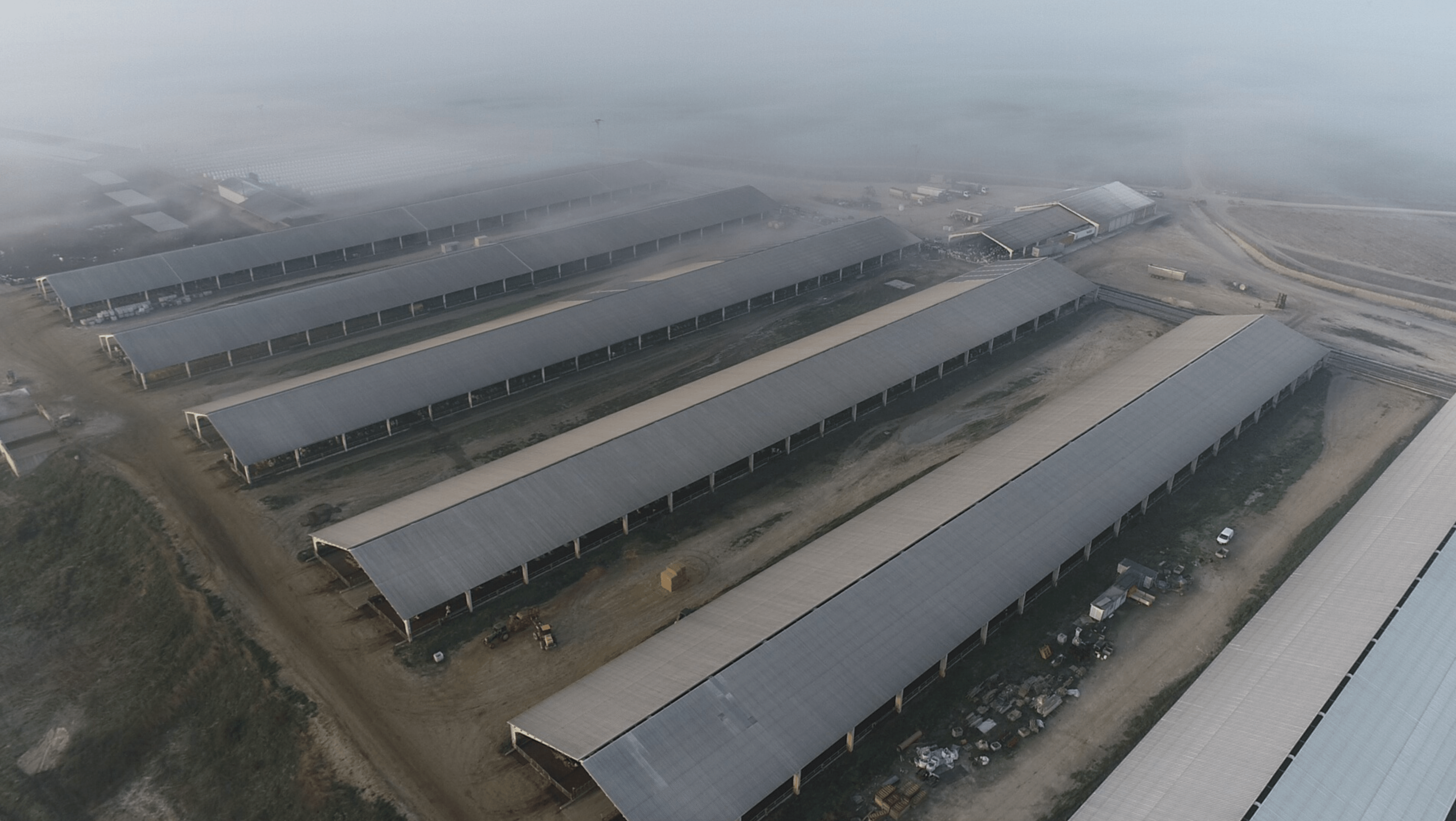The piercing sounds of shrieking animals. The pungent smell of ammonia, emanating from endless piles of animal manure. Rivers and streams polluted by animal waste, left full of green algae. People who live near a factory farm feel its presence every minute, every day of their lives.
The impacts of the industrial meat and dairy production can be felt far beyond the borders of neighbouring towns and villages. Factory farming fuels the climate emergency, with the massive amount of greenhouse gases it releases. In every corner of the earth, it’s rivers and oceans have become polluted with animal waste. Forests are clear-cut for the cultivation of feed, causing a massive loss of biodiversity.

The dairy factory farm near the town of Caparroso, Spain © Greenpeace / Tània Garnica
People living close to factory farms are standing at the frontlines of the struggle against an industry that is destroying their communities, and impacting all of us. These small communities, who live in the shadows of the farms, suffer, struggle, fight and at times win against these factories.
Greenpeace went on a journey through Europe to Spain, Denmark, France, and Italy to collect some of their stories. We’re urging you to read them, then decide for yourself. If you agree it is time to put an end to factory farming, and instead support the transition to eco farming and veggie alternatives, sign our global call to action.
Spain

The dairy factory farm near the town of Caparroso, Spain © Greenpeace / Wildlight
The dairy factory farm near the town of Caparroso in Spain has multiple rows where calves are kept, deprived of any contact with their mothers, without the possibility to move around. Green algae clogs the waters near the farm, probably due to the high nutrient content of the disposed manure. The Valle de Odieta farm is one of the biggest dairy farms in Spain. While industrial installations are constantly getting bigger and bigger in Spain, small local farmers fear for their livelihoods.

Ricardo Antón, aged 56, runs an organic horticulture farm in Caparroso © Greenpeace / Wildlight
This is Ricardo Antón, aged 56. He runs an organic horticulture farm in Caparroso, the village is next to a dairy factory farm. Ricardo caters to small clients, including two school canteens. “All these big factory farms represent a threat to the ecosystem in the area. Smaller enterprises can hardly sustain their production. The traditional farmer is disappearing,” Ricardo says.
Denmark

Dead pigs dumped outside a Danish factory farm © Greenpeace / Wildlight
In Denmark, outside the Vandvaerksgaarden pig factory farm in the small village of Tingerup, locals regularly see dead pigs dumped in the trash. Denmark produces around 33 million pigs annually. The country has the world’s highest production of meat per capita. Like many other farms in the area, Vandvaerksgaarden is owned by the family of Peter Kjaer Knudsen. The family has already been fined for poor animal welfare and polluting streams with manure.

Bente lives next door to a massive farm © Greenpeace / Wildlight
This is Bente Joergensen. For more than 20 years the former high school teacher has been living in an old rural house, together with her husband, only 100 meters away from the industrial pig farm Vandvaerksgaarden. When the smell is strong, she has to wear a face mask outdoors, “The smell is so awful, that it makes me feel sick, my head aches and my eyes are red and swollen. The factory farms surrounding our town have ruined my life.”
France

The egg-laying hen factory farm near Lescout, France © Greenpeace / Wildlight
The egg-laying hen factory farm Gallès SAS near the French village of Lescout is farming 185,000 hens. The village itself has only 700 inhabitants. Many locals have reported frequent smells and noise, and some are worried that harmful substances in the air could cause cancer. A court-appointed expert had started to investigate the situation, but up to now the local governor refuses to carry proper air quality measurements.

Nicolas and his family live close to the factory farm © Greenpeace / Wildlight
This is Nicolas Mougel, 31 years old. He is a father of five. The family live close to the factory farm in Lescout. When the air smells bad it becomes difficult for the family to enjoy the outdoors, and Nicolas’ children sometimes cover their faces when they play outside. Nicolas is concerned about the potential toxicity of the air they’re breathing, especially for his three month old child.

N. has survived eye cancer © Greenpeace / Wildlight
N., 62 years old, who prefers to keep her name anonymous, is administering drops to her eye to keep it hydrated. She has lived in Lescout for almost 30 years and is the only survivor of two cases of eye cancer recorded in the village. It’s an extremely rare form of cancer. Locals in the village have expressed their concerns on what, according to their calculations, is an extraordinary high rate of cancer in the area. Even though the malignant disease is healed, N.’s vision remains affected. N. recalls: “My doctors couldn’t identify the cause of my tumour, but they mentioned it could be caused possibly by the factory farm.”
Italy

The pig factory farm in Schivenoglia, Italy © Greenpeace / Tommaso Galli
This pig factory farm lies in Schivenoglia, a small village in Italy’s Lombardia region. The farm holds around 4,500 pigs. In the area there is a high concentration of intensive pig farms. A local committee is fighting against their expansion and against the construction of new installations.

Maura is fighting against factory farms near her village © Greenpeace / Tommaso Galli
Maura Cappi, aged 50, leads a local committee in the village of Schivenoglia. In 2017, Maura’s committee won a municipal referendum against the construction of a new pig factory farm in the area. The company then appealed the decision, but lost the appeal. Maura, who owns a family farm herself, is happy. But she will keep on the struggle. “This is an unhealthy industry that threatens our environment and our economy.”
Nora Holzmann is the global communications lead for the Meat and Dairy Campaign at Greenpeace


Awesome post! Keep up the great work! 🙂
Great content! Super high-quality! Keep it up! 🙂
Very good info. Lucky me I came across your website by chance (stumbleupon).
I have bookmarked it for later!
My brother recommended I might like this web site.
He was entirely right. This post truly made my day. You cann’t imagine just how much time I had spent for this information! Thanks!
What a information of un-ambiguity and preserveness of precious know-how about unexpected emotions.
Hey there! Someone in my Myspace group shared this website
with us so I came to look it over. I’m definitely enjoying the
information. I’m book-marking and will be tweeting this to my
followers! Terrific blog and wonderful design and style.
After checking out a number of the blog posts on your web page, I honestly like your technique of
blogging. I saved it to my bookmark webpage list and will be checking back soon. Please visit my
web site as well and tell me how you feel.
P.S. If you have a minute, would love your feedback on my new website
re-design. You can find it by searching for «royal cbd» — no sweat if you can’t.
Keep up the good work!
I’m not sure why but this weblog is loading very slow for me. Is anyone else having this problem or is it a problem on my end? I’ll check back later and see if the problem still exists.
I really enjoy the blog.Much thanks again. Will read on…
I will right away snatch your rss feed as I can not find your e-mail subscription link or e-newsletter service. Do you have any? Please permit me understand in order that I may just subscribe. Thanks.
I’d post to let you know. The design look great though!
Sie-haben einen fantastischen Blog Dank.
gotara bi nirx. Wylma Kele Berny
This should be the best collection of blogging website i ever found out. Toinette Joshua Pelletier
El vostre article és bonic. Claribel Currie Winfrid
Sie haben sehr interessante Details festgestellt! ps anständige Website. Rosemarie Nataniel Beckie
Sie haben sehr interessante Details festgestellt! ps anständige Website. Prudi Stacy Heigho
A person essentially assist to make severely posts I might state. That is the very first time I frequented your website page and thus far? I surprised with the research you made to create this actual put up amazing. Fantastic task! Madelon Hewitt Nealson